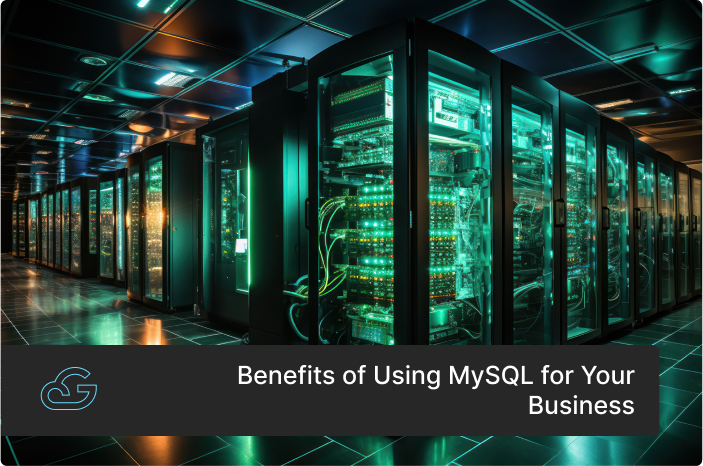Blogs / MySQL
7 Benefits of Using MySQL for Your Business
By
Sibin Vincent
Posted: February 21, 2024
• 7 minutes, 6 seconds
As organizations start embracing a data-driven operating model, it is pivotal that they store and manage their enterprise data efficiently. And that’s where database management systems come into play. With a database management system, users can access data repositories. It enables them to perform tasks like retrieving, updating, and managing data within the database.
There are several database management systems available on the market, such as MySQL, PostgreSQL, MSSQL, MongoDB, Redis, etc. Among these options, MySQL has garnered immense popularity in recent years. And according to Statista, it is the second-most popular database, behind the Oracle database.
Renowned for its versatility, ease of use, and performance, MySQL is the go-to database management system for many companies across different industries. Some of the prominent names that use MySQL for their data operations include Facebook, Netflix, Shopify, Uber, etc. Highly adaptable and compatible, it is apt for a wide range of applications like web development, content management, business intelligence, and much more.
In this blog post, we will examine MySQL closely while highlighting its key benefits.
So, let’s start with a brief introduction to MySQL.
What is a MySQL Database?
MySQL is an open-source relational database management system used for storing, organizing, and managing structured data in a tabular format. It comes with extensive community support, encompassing forums, documentation, and contributions from developers around the world. There are numerous features and attributes that make MySQL a popular choice as a database management system.
One of the most important features of MySQL is its indexing mechanism, which facilitates faster data retrieval. It is compatible with various data types—integers, strings, floating-point numbers, etc. And it supports stored procedures and triggers, which help streamline querying. It is also capable of extensive text processing and exhibits adherence to ACID properties (Atomicity, Consistency, Isolation, Durability) when storing data.
With a solid understanding of MySQL’s capabilities, let’s now analyze how it positively impacts organizations.
Benefits of Using MySQL in Your Business
-
Scalability & Flexibility
-
High Performance & Availability
-
Cost-Effectiveness
-
Data Security & Regulatory Compliance
-
Simplified Database Operations
-
Wide Range of Business Use Cases
-
Total Cost of Ownership
MySQL offers unparalleled scalability and flexibility to accommodate growing data volumes and user demands. That is, it can easily handle complex applications and large datasets without leading to performance degradation and resource wastage. With the ability to scale both horizontally and vertically, it is ideal for organizations with constantly fluctuating data operations.
For instance, e-commerce organizations, during promotional events or while running campaigns, often face a sudden surge in website traffic, leading to an increased data influx. And in scenarios like these, MySQL will be the perfect pick as a database management system.
MySQL is known for its exceptional performance and availability. With enhanced query execution and effective data storage mechanisms, it can provide swift access to critical information while maintaining data integrity and consistency. The unique storage engine framework is one of the critical strengths of MySQL. It enables system administrators to adjust the database server as per the workload demands (high-speed transaction processing, efficient data analytics, and much more).
MySQL also supports full-text indexing, which allows users to search and retrieve textual data from large datasets. This is particularly useful for applications like search engines, content management systems, and document repositories. Furthermore, it leverages distinct caching mechanisms to reduce the need for repeated disk access, enhancing the overall system responsiveness and throughput.
On top of the performance attributes, MySQL is designed to meet the availability demands of modern-day businesses. With its configuration options, users can deploy clusters of servers and facilitate master-slave replication for instant failover, making MySQL an effective solution for mission-critical applications and web-based businesses that warrant 24/7 availability.
MySQL’s open-source nature stands out as its primary advantage, making it an attractive and cost-effective option for businesses, especially for small and medium-sized businesses and startups. Users can access the source code, modify it as per their requirements, and integrate it into their workflows swiftly and effectively.
Moreover, MySQL boasts a large and active user community, which provides valuable documentation and resources to support users with their MySQL implementation. This collaborative environment fosters knowledge sharing, troubleshooting, and problem-solving, reducing the complexities and major expenses associated with setting up and operating a MySQL database.
Users must also remember that there are various versions of MySQL. The paid versions include advanced functionalities, extensions, and Oracle support. But despite all this, the community version is still widely adopted as it offers superior speed, scale, and reliability and helps organizations avoid paying hefty license fees.
MySQL prioritizes data security and compliance adherence, offering a range of features to safeguard sensitive business data and meet regulatory requirements. While the community edition of MySQL includes basic security measures such as tablespace and table encryption, network encryption, and access control lists (ACLs), more advanced authentication and access control mechanisms are available in the enterprise edition or through integration with third-party tools or plugins.
For businesses requiring regulatory compliance, the enterprise edition of MySQL, backed by Oracle, offers additional features like transparent data encryption (TDE), data masking, auditing, and data de-identification mechanisms. These features enable businesses to meet compliance directives established by industry standards such as SOC, PCI DSS, and HIPAA. By leveraging MySQL’s robust security measures and compliance features, businesses can protect their sensitive data, mitigate compliance risks, and build trust with their customers.
MySQL is the easiest to use among all the popular relational database management systems. It uses the widely known Structured Query Language (SQL) for database operations and has an average download and installation time of approximately 30 minutes. It is also compatible with various platforms, such as Windows, Linux, Unix, etc.
Designed for simplicity and user-friendliness, it promotes streamlined database management with intuitive graphical tools like the MySQL Workbench. These tools help set up a comprehensive visual console to administer databases without needing to use complex command lines for many tasks. Additionally, the rich documentation, including tutorials, forums, manuals, guides, articles, and more, provides valuable assistance and guidance to users at every level of expertise.
MySQL is the go-to database management solution for diverse business needs across industries. With its robust features and flexible architecture, it plays a vital role in supporting critical business functions that include powering e-commerce platforms, managing customer databases, handling financial transactions, etc.
For example, the popular e-commerce platform Shopify is using MySQL to streamline several aspects of their data operations. During Black Friday and Cyber Monday sales, the database management system was pivotal in providing Shopify’s customers with a seamless shopping experience while empowering the company’s other aspects.
Similarly, MySQL extends beyond e-commerce to other sections like media and entertainment, healthcare, banking, insurance, and much more. Its adaptable nature and reliable performance make it the apt choice for businesses seeking seamless database solutions to enhance their operational efficiency.
MySQL boasts a low total cost of ownership compared to other proprietary database management systems. With its open-source model, MySQL eliminates the need for costly upfront licensing fees, which are commonly associated with other commercial database solutions available on the market. This liberates businesses from the budgetary constraints of setting up a database management system, enabling them to redirect their resources elsewhere.
Enhance Operational Efficiency with Gsoft Cloud MySQL Database Services
At Gsoft Cloud, we specialize in providing effective managed MySQL Database Services customized for your business needs. From maintenance activities and upgrades to robust backup and recovery solutions, we handle all the aspects of database management, allowing you to focus on what matters most—innovation and growth.
By partnering with Gsoft Cloud, you will acquire:
- A scalable and reliable database that will grow with your business needs.
- Top-notch data security and privacy.
- Seamless database migration.
- Optimized database performance.
Summary:
MySQL offers numerous benefits that empower businesses to manage data effectively, drive innovation, and achieve sustainable growth. From its open-source architecture and scalability to its high performance and security features, MySQL continues to be the database solution of choice for businesses worldwide. By leveraging MySQL’s strengths, businesses can unlock new opportunities, streamline operations, and stay ahead in today’s dynamic market landscape.
Are you seeking a managed MySQL service provider to streamline your database operations? Reach out to us at www.gsoftcomm.net


Get Know More About Our Services and Products
Reach to us if you have any queries on any of our products or Services.











